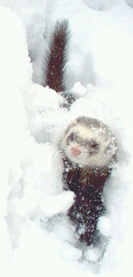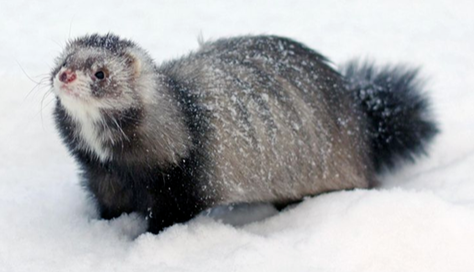Protect your Ferrets from Frostbite and Hypothermia Ferrets are fur-bearing mammals. Ferrets can handle cooler temperatures better than warm weather. Even so if your ferret is usually housed indoors, their undercoats will be thinner in Winter, than those of ferrets that live outdoors all year round. Although your pet ferrets have fun playing in the snow, they must be protected from over exposure to the cold which can result in “hypothermia.” What is hypothermia? Hypothermia is abnormally low body temperature. It occurs when your ferret rapidly loses body temperature due to the sudden and extreme cold. Signs of hypothermia:
What is "frostbite": “Frostbite” is caused by injury to the skin due to cold temperatures. As frostbitten tissues thaw, they may become red and very painful due to inflammation. In animals changes due to frostbite can take days to appear, especially if the affected area is small or on non-weight bearing areas, such as the tip of the tail or ears. Signs of “frostbite:”
Indoor Ferrets In the United States and Canada, most ferrets are kept indoors. If so, there fur will not reach the thickness needed to protect them from cold temperatures (less than 50 degrees F/ 10 degrees C). How long can my ferret play outside in the Winter? Limit your ferret’s exposure to cold winter temperatures and snow to not more than 10 to 15 minutes, although smaller ferrets may be less tolerant to the cold. DO monitor your ferret closely for signs of shivering, and bring her inside. DO NOT expose your ferret to freezing and subfreezing temperatures. Outdoor Ferrets Keeping domestic ferrets outdoors is NOT recommended for a variety of reasons. When kept outdoors, they must first become accustomed to the environmental temperatures over months. Even so, all animals must be kept in secure enclosures (sheds, etc.) from which they cannot escape. They must be protected from wind, rain, and cold temperatures, and in the summertime from sun and heat. In such cases, ferrets must have warm bedding and are generally housed together for warmth. Water and food must be checked frequently, to avoid freezing and insect infestation. For more reading:
Comments are closed.
|
Details
Archives
April 2024
Categories
All
|
|
Terms and Conditions
|
allFerrets® 2014-2024. ALL RIGHTS RESERVED.
Proudly designed by widgIT |


 RSS Feed
RSS Feed
